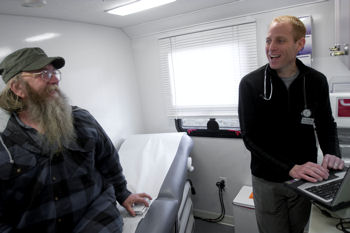Will the 2008 elections be the turning point for health care?
For the first time in 15 years, health care reform is back as a major campaign issue.
For the first time in 15 years, health care reform is back as a major campaign issue.
Leading Democratic candidates are banking on the 2008 elections to create a mandate for comprehensive health care reform that results in coverage for everyone. The leading Republican candidates are proposing ways to reduce health care costs and expand coverage to poorer Americans and smaller businesses.
How likely is it that the voters will give the new President and Congress a mandate to overhaul the health care system? Recent opinion polls give a mixed message.
Public support has been rising since the mid-1990s for government action to help disadvantaged Americans, according to a March 2007 poll by the Pew Research Center for the People & the Press. More Americans believe that the government has a responsibility to take care of people who cannot take care of themselves, and that it should help more needy people even if it means going deeper into debt. These attitudes have undergone a major change since the Republican victory in 1994.
The Pew poll was not specific, however, on whether the federal government should subsidize health coverage for the disadvantaged and/or require people to have health insurance.
In December 2007, the Kaiser Health Tracking Poll found that Iraq tops the list of issues the public wants to hear presidential candidates discuss, with more than a third (35%) naming the war as one of the top two issues. Health care (30%) ranked second, and is the top domestic issue people want to hear about, followed by the economy (21%) and immigration (17%). Republicans say they would rather hear about reducing health care costs (47%) than expanding coverage for the uninsured (19%). Democrats are more split, with 42% saying they'd rather hear about increasing coverage rather than reducing costs (35%).
Reform might still happen
These data suggest that the voters are unsure about health care reform. Anything less than a strong and deep election mandate would likely doom efforts—as it did in the early 1990s. Just ask Bill—and Hillary—Clinton. Still, there are reasons to hope that the 2008 elections could be the turning point that leads to comprehensive health care reform.
For one thing, this time around, reform advocates have the evidence to refute the biggest argument made against health care reform, which is that U.S. health care is the best in world—so why change it?
As documented in a recent ACP position paper analyzing U.S. health care compared to other industrialized countries, details of which are available online, Americans pay much more for their health care but get poorer quality, efficiency and access in return. It found that high-performing health care systems guarantee health insurance coverage for all, support and value primary care, and provide incentives for patients to use health care resources wisely. The paper presents a road map for the U.S. to achieve a better performing health system, learning from the experiences of other countries.
Second, this time around, physicians are the ones leading the fight for a better health care system.
In the past, physician membership organizations were often accused, with some justification, of being on the sidelines or even opposing health care reform. ACP is showing the world that this is no longer the case.
At the College's State of the Nation's Health Care briefing on Jan. 31, the ACP called on candidates running for President or Congress to sign a Candidate's Pledge, viewable online, to advocate for reforms that would include:
- coverage for all,
- support for primary care,
- reductions in administrative costs,
- investment in health information technology,
- incentives for patients to use health care resources wisely, and
- support for research.
And, the College has created a Web tool that allows our members to weigh the announced positions of the presidential candidates against the ACP's policy benchmarks for achieving a high performing health care system. This tool, which is updated regularly, is designed to help our members become more informed voters.
ACP is non-partisan and does not see health care reform as a Democratic or Republican issue but as national imperative that transcends political affiliations. Americans in red and blue states alike are paying a high price for a health care system that costs too much and gives too little in return. Republicans and Democrats have a shared national interest in creating a U.S. health care system that is second to none.
It will not be known for months whether the 2008 election creates a real mandate for health care reform. Even if it does, it remains to be seen if the new President will have the political skills needed to get Congress to enact the desired changes. Considering that universal coverage in the U.S. was first proposed (unsuccessfully) by President Truman and discussed in every election since then, history suggests that this will be a daunting challenge, no matter who sits in the White House.
History also shows us that there are times in the nation's history when ideas—think of the civil rights movement—long considered as out-of-reach become accepted as right and necessary. ACP is committed to doing what it can to inform the 2008 elections so that health coverage for all is finally accepted as being right and necessary for a just society.




